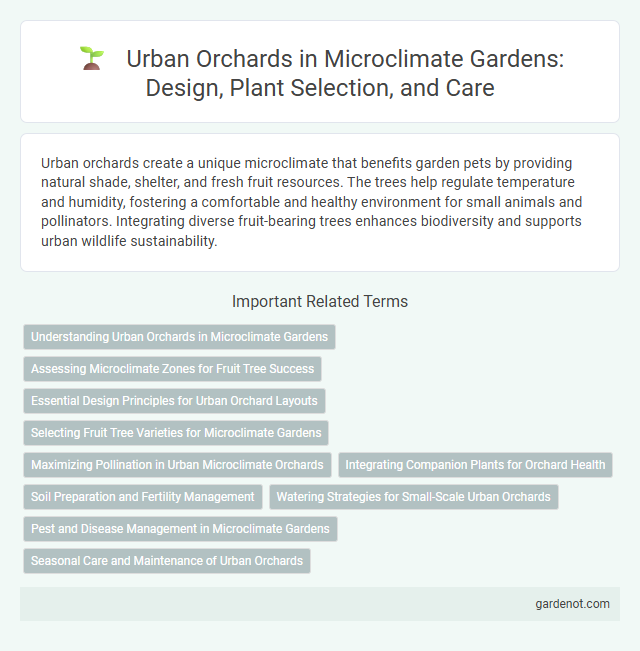Urban orchards create a unique microclimate that benefits garden pets by providing natural shade, shelter, and fresh fruit resources. The trees help regulate temperature and humidity, fostering a comfortable and healthy environment for small animals and pollinators. Integrating diverse fruit-bearing trees enhances biodiversity and supports urban wildlife sustainability.
Understanding Urban Orchards in Microclimate Gardens
Urban orchards within microclimate gardens enhance biodiversity by creating localized environments that optimize temperature, humidity, and soil conditions for fruit-bearing trees. These orchards mitigate urban heat islands and improve air quality, while providing fresh produce and supporting pollinators in city landscapes. Strategic placement and species selection in microclimate gardens ensure sustainable growth and resilience against urban environmental stressors.
Assessing Microclimate Zones for Fruit Tree Success
Urban orchards thrive by carefully assessing microclimate zones, which influence temperature, sunlight exposure, and humidity critical for fruit tree growth. Mapping variations within city landscapes identifies optimal planting sites, improving fruit yield and tree health. Tailoring care to these microclimates enhances resilience against urban heat islands and fluctuating weather conditions.
Essential Design Principles for Urban Orchard Layouts
Urban orchard layouts prioritize optimal sunlight exposure, ensuring tree placement maximizes photosynthesis and fruit yield. Incorporating diverse species enhances resilience to pests and climate variability, while strategic spacing facilitates airflow to reduce disease risk and supports healthy root development. Efficient irrigation design and soil management practices are essential for sustaining tree health in compact urban environments.
Selecting Fruit Tree Varieties for Microclimate Gardens
Selecting fruit tree varieties for urban orchard microclimate gardens requires prioritizing species that tolerate local temperature fluctuations, humidity levels, and sunlight variations specific to small-scale urban environments. Cold-hardy trees like dwarf apples, pears, or plums adapt well to restricted space and microclimate challenges, enhancing yield and disease resistance. Optimizing rootstock choice and planting orientation further maximizes growth by leveraging urban heat islands and wind patterns for better fruit production.
Maximizing Pollination in Urban Microclimate Orchards
Maximizing pollination in urban microclimate orchards involves planting a diverse range of flowering species that bloom sequentially to support continuous pollinator activity. Creating sheltered zones with native plants enhances habitat for bees, butterflies, and other pollinators, while reducing wind and temperature extremes common in city environments. Integrating companion planting and providing water sources further boost pollinator presence, leading to improved fruit set and orchard productivity.
Integrating Companion Plants for Orchard Health
Integrating companion plants such as marigolds, nasturtiums, and clover within an urban orchard enhances pest control and soil fertility, creating a resilient microclimate garden. These plants attract beneficial insects like pollinators and predatory beetles, reducing the need for chemical pesticides and promoting a balanced ecosystem. Strategic companion planting helps conserve moisture and improve nutrient cycling, ensuring healthier fruit tree growth in compact urban environments.
Soil Preparation and Fertility Management
Soil preparation in an urban orchard involves deep tilling to enhance aeration and drainage, combined with the incorporation of organic compost to improve soil structure and nutrient content. Fertility management prioritizes balanced nutrient supply through regular application of nitrogen-rich fertilizers and micronutrient supplements tailored to fruit tree species. Monitoring soil pH and implementing mulching techniques help maintain optimal moisture levels and support microbial activity essential for healthy orchard growth.
Watering Strategies for Small-Scale Urban Orchards
Efficient watering strategies for small-scale urban orchards include drip irrigation systems and rainwater harvesting techniques, which optimize water use and reduce waste. Implementing mulching around fruit trees retains soil moisture and regulates temperature, enhancing tree health in microclimate gardens. Regular monitoring of soil moisture levels ensures timely watering, preventing overwatering and promoting sustainable urban orchard management.
Pest and Disease Management in Microclimate Gardens
Effective pest and disease management in urban orchards within microclimate gardens relies on integrated strategies such as biological controls, regular monitoring, and the use of resistant plant varieties. Microclimate conditions, including humidity and temperature variations, significantly influence pest populations and disease prevalence, necessitating tailored interventions. Employing companion planting and maintaining soil health further enhances resilience against common orchard pests like aphids, mites, and fungal pathogens.
Seasonal Care and Maintenance of Urban Orchards
Seasonal care and maintenance of urban orchards involve strategic pruning during dormancy to enhance fruit production and prevent disease. Soil health is optimized with organic mulching and targeted fertilization in spring and fall, supporting root development and nutrient uptake. Regular monitoring for pests and diseases enables timely interventions, ensuring the long-term vitality and productivity of urban orchard trees.
Urban orchard Infographic

 gardenot.com
gardenot.com